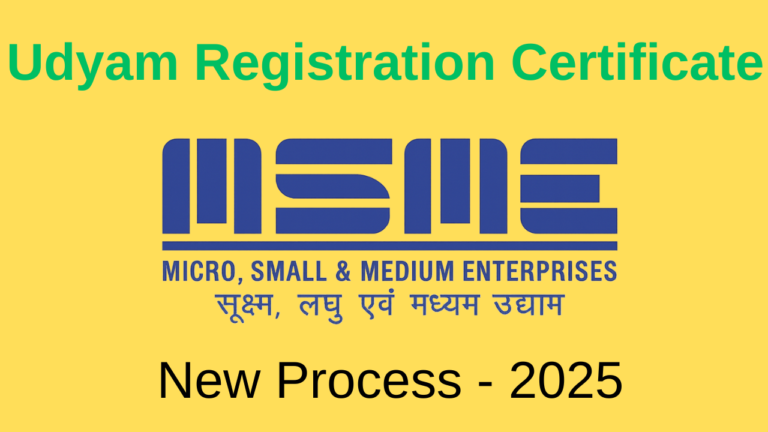
1. The Digital Mandate: Why Udyam Registration is Mandatory for MSME Growth
Udyam Registration, launched on July 1, 2020, represents a crucial pivot in India’s policy approach toward formalizing and empowering its Micro, Small, and Medium Enterprises (MSMEs). Designed under the ‘Ease of Doing Business’ initiative, the Udyam ecosystem establishes a unified, digital identity for enterprises across both manufacturing and service sectors.
2. MSME Classification: The Composite Criteria for Eligibility
The shift to Udyam Registration coincided with a fundamental change in how enterprises are classified as Micro, Small, or Medium. Effective July 1, 2020, the government introduced a composite criteria that simultaneously relies on two factors to determine an enterprise’s MSME status :
Investment in Plant and Machinery or Equipment.
Annual Turnover.
To qualify under a specific category, the enterprise must satisfy the financial ceiling for both metrics. This data is cross-verified directly against the enterprise’s Permanent Account Number (PAN) and Goods and Services Tax Identification Number (GSTIN) filings with the respective government departments, enhancing transparency and data accuracy.
MSME Classification Criteria (Post-July 1, 2020)
| Classification | Investment in Plant & Machinery/Equipment | Annual Turnover |
| Micro Enterprise | Not more than ₹1 Crore | Not more than ₹5 Crore |
| Small Enterprise | Not more than ₹10 Crore | Not more than ₹50 Crore |
| Medium Enterprise | Not more than ₹50 Crore | Not more than ₹250 Crore |
Once an enterprise’s annual turnover exceeds ₹250 crore, or its investment surpasses ₹50 crore, it officially graduates out of the Medium Enterprise category, losing its MSME status and related benefits.
3. Udyam vs. Udyog Aadhaar: The Shift to Digital Verification
Udyam Registration fundamentally replaced the legacy Udyog Aadhaar Memorandum (UAM) to address the prior system’s crucial lack of backend verification. While UAM relied heavily on self-declaration using only an Aadhaar number, Udyam’s superiority lies in its deep technological integration.
Udyam automatically links with the enterprise’s PAN and GSTIN (where required by law) to fetch and verify financial details from tax databases. This integration ensures higher data integrity and regulatory compliance.
Furthermore, the Udyam system strictly adheres to the ‘One-Aadhaar, One-Udyam’ principle: an enterprise may file only one Udyam Registration. This prevents the fragmentation of businesses to maximize benefit access, a practice possible under the older Udyog Aadhaar system. Enterprises registered under UAM/EM-II before June 30, 2020, were mandated to re-register under Udyam to maintain their MSME status and associated benefits.
4. Navigating the Registration Process and Consultancy Services
Mandatory digital identifiers are required based on the entity type: Aadhaar for the proprietor (Proprietorship), Karta (HUF), or managing partner (Partnership), and PAN/GSTIN (if applicable) for corporate structures like Company or LLP.
Despite the zero-cost official process, a market exists for private facilitation. Numerous consultancy organizations, such as the ISO Certified Consultancy Private Organisation operating via https://eudyamaadhar.org/ , offer paid assistance. These services simplify the process, assist with complex form filling, and ensure accurate compliance, which can be critical for entrepreneurs unfamiliar with the composite criteria. However, the Ministry of MSME has issued explicit warnings that aside from the official government portal, “no other private online or offline system, service, agency or person is authorized or entitled to do MSME Registration”. Any fee paid covers the consultancy service, not the official registration itself.
5. Unlocking Key Financial and Legal Advantages
Udyam Registration transforms the financial landscape for the enterprise through several structural benefits:
Priority Credit & Low-Cost Loans: Udyam status ensures automatic classification under Priority Sector Lending (PSL) norms, giving MSMEs preferential access to credit, often at subsidized interest rates.
Collateral-Free Financing (CGTMSE): The registration provides access to the Credit Guarantee Fund Trust for Micro and Small Enterprises (CGTMSE) scheme, which offers a guarantee cover to banks for collateral-free credit facilities up to ₹5 crore . This mitigates risk for lenders and addresses a major barrier to small business financing.
Protection Against Delayed Payments: One of the most critical legal protections, restricted to Micro and Small Enterprises, is the ability to seek recourse through the MSME Samadhaan Portal . Cases are referred to Micro & Small Enterprises Facilitation Councils (MSEFCs), where buyers who delay payments are legally mandated to pay compound interest at three times the bank rate, providing a powerful legal shield .
Procurement & Subsidies: Registered units receive special preference in government tenders. They also gain access to schemes offering reimbursement for costs associated with ISO certification, and subsidies for Intellectual Property (IP) protection (patents and trademarks)
6. The Future of MSME Support: The ME-Card Initiative
In a major policy evolution, the Union Budget 2024-25/2025-26 introduced the concept of the ME-Card, a customized credit card scheme specifically targeting the smallest segment.
Udyam Registration is thus the foundational strategic step, ensuring enterprises remain compliant, verifiable, and positioned to leverage the government’s robust and continuously evolving support structure for India’s MSME sector.

